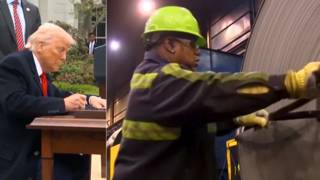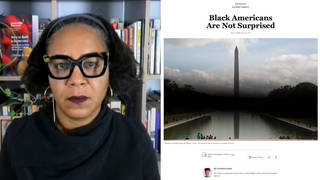
Guests
- Ziad Abu-Rishco-director of the M.A. program in human rights and the arts at Bard College, research fellow at the Beirut-based Lebanese Center for Policy Studies.
After days of protests, Lebanon’s government has resigned following the devastating explosion at the Port of Beirut that killed 200 people and injured thousands. The port blast, the source of which was 2,700 tons of highly explosive ammonium nitrate left unattended in a warehouse for more than six years, occurred as Lebanon was already facing political, economic and public health crises. We speak with Ziad Abu-Rish, a historian and research fellow at the Lebanese Center for Policy Studies and co-director of Bard College’s Masters of Arts program in human rights and the arts, who says despite public outrage toppling the government, structural change may be harder to attain. “The fall of cabinets and even the holding of early parliamentary elections are not necessarily signs that fundamental transformation is underway in Lebanon,” Abu-Rish says. “For now at least, this is politics as usual.”
Transcript
AMY GOODMAN: We begin in Lebanon, where the government resigned Monday, following days of protest after more than 200 people were killed and thousands injured in a devastating blast at Beirut’s port. Dozens of people are still missing, many of them foreign workers. Prime Minister Hassan Diab announced his resignation in a televised address.
PRIME MINISTER HASSAN DIAB: [translated] We follow the will of the people to hold accountable those responsible for this disaster, that has been in hiding for seven years, and their desire for real change, from the corrupt, destructive state, state of brokerages and theft, to the state of law and justice and transparency, to a country that respects its people. In the face of this reality, we take a step back to stand with the people to undergo this battle of change with them. We want to open the door toward national salvation that the Lebanese people are taking part in, and thus I am announcing today the resignation of this government.
AMY GOODMAN: The Lebanese president, Michel Aoun, accepted Diab’s resignation but asked him to stay on in a caretaker capacity until a new cabinet is formed. Last week’s explosion was triggered by 2,700 tons of highly explosive ammonium nitrate left unattended in a warehouse at the port for over six years. The port blast came at a time when Lebanon’s already facing political, economic and public health crises.
Ziad Abu-Rish joins us now from Beirut, Lebanon, a historian and research fellow at the Lebanese Center for Policy Studies and co-director of Bard College’s Master of Arts program in human rights and the arts.
Welcome to Democracy Now! It’s great to have you with us, Ziad Abu-Rish. Can you start off by talking about the significance of the fall of the Lebanese government, but the fact that the government remains as a caretaker government, this as protesters continue to take to the streets in the midst of the aftermath of this horrific explosion?
ZIAD ABU-RISH: Absolutely, Amy. And thank you for having me and shedding light on this important topic.
The fall of the Diab government was a demand of protesters and critics of the government, as well as people who participated in the October 2019 revolution in Lebanon and had opposed the formation of this Cabinet. However, I think it’s also important to recognize that the fall of this government is also the product of internal conflicts between the various political parties that make up Lebanon’s political class.
You mentioned the issue of remaining in power as a caretaker government. This is actually a very normal state of affairs after governments submit their resignation. And in fact, the fall of cabinets and even the holding of early parliamentary elections are not necessarily signs that fundamental transformation is underway in Lebanon. For now at least, this is politics as usual. And the big question for people is: What is going to come in place of this Cabinet that has just resigned in the wake of the very deadly and devastating explosion, and a Cabinet that has failed to stem the tide of various financial, economic, health and infrastructural crises?
JUAN GONZÁLEZ: And, Ziad Abu-Rish, what about the president himself, Michel Aoun, and the other members of Parliament? Are the protesters calling for a much more wholesale change in the government? And if so, what kind of structural changes do you think are needed in Lebanon today?
ZIAD ABU-RISH: Well, you know, I think it’s important to recognize that protesters are not necessarily unified in their demands. However, I think they share a wholesale rejection of the status quo, in which all major political parties in Lebanon are implicated. Whether it’s President Michel Aoun or presidents that have come before him, whether it’s Speaker of Parliament Nabih Berri, all members of Parliament currently or former parliaments, this Cabinet or former cabinets, they have collectively failed to deliver on any of the aspirations and needs of the majority of the people who live in Lebanon, including citizens, refugees, migrant workers and other people.
I think what we want to look for as we move forward, as an indication if there’s going to be structural change or not, is who is going to be appointed to the next cabinet. Is this cabinet going to be an independent cabinet? Is it going to be comprised of competent persons? And is it going to be empowered to legislate the necessary laws that are required to begin the transformation of the political system in Lebanon and pave the way to some meaningful accountability and transparency?
For example, the electoral law in Lebanon is constantly voted on and passed before each election cycle. Electoral laws, as you know, determine districting, the distribution of seats and the threshold for making it into office. This has largely allowed for this political class to reproduce itself every time elections are held. And if the electoral law is not fundamentally changed, then there’s no reason to suspect that new elections will result in an entirely new composition of this Parliament.
Of course, there are other reforms that we can think of that protesters have demanded for a long time, including judicial reform for the creation of a truly independent judiciary, an addressment of the economic crisis, which has only continued to worsen. There has been no forensic audit to understand what happened and who is responsible. There have been no stopgap measures taken to prevent the continuous downward spiral. And, of course, now, in the wake of the explosion, any new cabinet is going to have to establish a meaningful investigation of the causes of the explosion and holding those people responsible. None of these things have happened, not in the Diab Cabinet and not in other cabinets before them. And this is the fundamental issue here in Lebanon, if anyone hopes to see the kind of transformation that most protesters are calling for.
AMY GOODMAN: Can you respond to the French president, Macron, coming to Lebanon? The opening sentence of an AP report on his trip begins, “It was almost as if Emmanuel Macron forgot that Lebanon is no longer a French protectorate.” He was in the streets before Lebanon’s prime minister was. If you can talk about that relationship and also the $300 million that have been conferenced, a donors’ conference set up, and where that money would go?
ZIAD ABU-RISH: Absolutely. Well, the fact that Macron was in the streets before the prime minister or any other major official in Lebanon was is more a reflection of the unaccountability of the Lebanese political class to the population of Lebanon than it is the goodwill intentions of the president of France.
I think Macron was trying to seize the initiative for France and the European Union to get ahead of the United States in paving a way for some type of exit of the political and multiple crises in Lebanon. And he is perhaps even trying to reposition France in relation to Lebanon and the broader Middle East.
That being said, I think it’s important to note that France, the United States, the European Union, the International Monetary Fund, the World Bank, as well as other powers, like Iran, Russia, Saudi Arabia, are all complicit in helping create, maintain and sustain the political system in Lebanon that most protesters are calling for the downfall of. So, this is either an 11th-hour about-face turn by the Macron government, and France more generally, or it’s a cynical attempt to reestablish relationships.
And as you mentioned yourself with that AP report, France was responsible for creating the state of Lebanon in the aftermath of World War II and was a colonial power from 1918 to 1946, when it withdrew. Most of the structural and institutional arrangements that are with us today in Lebanon were introduced and facilitated through French governance practices during the colonial period. And I think if France wants to really change its relationship with Lebanon or champion the aspirations of the people of Lebanon, it should at least begin with a public apology and taking responsibility for its role, past and present, from the establishment of Lebanon through the civil war and afterwards, in contributing to the situation, even though, as I always say, the primary responsibility for the status quo in Lebanon is first and foremost amongst the political parties that make up the political class here in Lebanon. That being said, outside powers have continuously aided and abetted them through financial aid, diplomatic support and other means.
JUAN GONZÁLEZ: I’m wondering if you could talk about the role of Hezbollah in the current situation. Clearly, the Lebanese government is trying to get financial assistance from the International Monetary Fund, yet Hezbollah was very closely tied to the Diab government. Could you talk about that relationship and how this affects the standing of Hezbollah within the multiparty situation that has existed in Lebanon for so many years?
ZIAD ABU-RISH: Absolutely. Well, I think we should start by making clear that Hezbollah is a part of the political system and the political class in Lebanon. It has participated in various parliaments. It has participated in various governments. And Hezbollah is perhaps the most powerful political party here in Lebanon. It has used this power to buttress the political system in Lebanon, and it has used that power to oppose and confront protesters in Lebanon. So I think that’s very important to make clear, and that any fundamental transformation, as protesters are demanding — kilon yani kilon, all of them means all of them — includes a fundamental rethinking of the role of Hezbollah in local politics here.
That being said, I think a focus on Hezbollah as the panacea for the problems of Lebanon misses the broader constellation of political forces and parties that have helped create, maintain and benefit from the system in place. I think we need to distinguish between legitimate criticisms and opposition to Hezbollah as a part of the broader political and economic system in Lebanon and what I would call illegitimate criticisms of Hezbollah, those that simply seek to reshuffle the chairs in Lebanon, to restructure the balance of power in Lebanon, in the favor of other members of the political class at the exclusion of Hezbollah. If we think that any solution to the fundamental problems of Lebanon can be achieved by simply eliminating Hezbollah from the equation, then we are misreading the situation on the ground. It is part and parcel of the problem, but as is all major politicians and all major political parties, especially those that have been backed by the United States, Saudi Arabia, France and others in the Western world.
AMY GOODMAN: Ziad, we just have 10 seconds, but do you expect the protests on the ground in this ravaged capital of Beirut to intensify?
ZIAD ABU-RISH: I do suspect that they will intensify. But as is always the case, that challenge is: Can they translate their presence on the ground into meaningful pressure for institutional and structural change in Lebanon? I wish them the best. I [admire and am] in awe of their bravery and courage despite repeated crises and traumas. And we’ll have to wait and see what happens.
AMY GOODMAN: Ziad Abu-Rish, I want to thank you for being with us, research fellow at the Lebanese Center for Policy Studies in Beirut, co-director of the master’s program in human rights and the arts at Bard College.
When we come back, we speak to The Atlantic's Ed Yong about how the coronavirus has humbled and humiliated the planet's most powerful nation. Stay with us.












Media Options